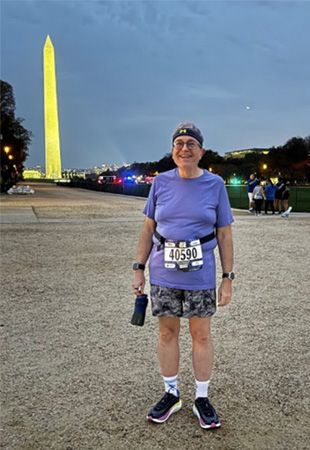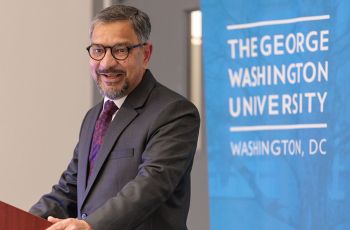
Matthew Henry knows what it means to climb a mountain. As a colorectal cancer survivor, he’s considering a trek to Mount Everest’s Thorung High Camp. At 16,010 feet in the air, it’s a strenuous climb. But it’s nothing compared to his climb to beat cancer.
In the fall of 2021, Matthew's primary care physician (PCP) referred him to Matthew Ng, MD, a colorectal surgeon at the GW Cancer Center. Matthew’s PCP had been treating him for several months for an internal hemorrhoid. Matthew had noticed blood during bowel movements. And, as a bike-to-work employee combined with the end-of-summer blackberry season, Matthew’s bowel movements had significantly changed.
“A cancerous tumor was growing all this time,” said Matthew. Once the Stage II cancer diagnosis was definitive, he started nearly two months of simultaneous radiation and chemotherapy treatments, known as total neoadjuvant therapy, before undergoing surgery in July 2022.
The treatments were difficult; Matthew described the pain from the radiation as “the most intense I’ve ever experienced,” and the chemo left him feeling debilitated. His care team put their multidisciplinary superpowers to work to provide a personalized intervention plan to help ease the pain. “They’re the most incredible people – Drs. Ng, Kim, Ranganath, and Goyal – all working with me and for me,” said Matthew.
Through collaboration, cure is within reach. The combined expertise of surgeons, oncologists, radiologists, and other specialists provides the most effective and personalized treatment plan for rectal cancer.”
In addition to the cancer treatments, Matthew saw Isha Kalia, PhD, for genetic counseling and testing. Matthew learned he carries a genetic mutation in the BRCA gene. While the BRCA gene has not been associated with an increased risk of colorectal cancer, it has provided Matthew with valuable information to inform his medical management. “Genetic testing empowers patients to undergo individualized cancer screening, the choice to make informed decisions about preventive surgical options to reduce their cancer risk, and provides the patient’s family members to access appropriate screening by identifying those family members at an increased risk for cancer,” Explained Dr. Kalia.
With evidence that the cancer had invaded the anal sphincter, the next step was a six-and-a-half-hour surgery during which Matthew’s rectum and anus were removed. He now wears a colostomy bag (a small, waterproof pouch that collects waste from the body through a stoma, an opening in the abdominal wall) and will for the rest of his life. “I’ve become habituated to being an ostomate (someone who wears a colostomy bag),” said Matthew, “I’ve learned to troubleshoot certain issues, like preventing leaks. It’s pretty much routine now.”
Matthew describes the recovery process with respect to his love of biking. From the first treatment for the hemorrhoid to the reconstructive plastic surgery by Dr. Ranganath and team, Matthew was instructed not to ride a bike for six months. He knew he needed to get back on his feet and recover from the months of radiation and chemo to regain strength. He asked the team, “Can I run?” The answer: Sure, just don’t ride a bike. Even though Matthew didn’t like running and fell for all the common misconceptions, thinking the sport would destroy his knees, he began running anyway.
A lifelong athlete, Matthew's new lifestyle hasn’t slowed him down. While he’s not biking as much as he used to, he’s still running (trail and road), walking, and hiking. He and his wife, Amy, are regular competitors in local 5- and 10-K races. They often hike with their son and daughter-in-law when visiting them at their home near Lake Tahoe. It was during one of those visits that the topic of hiking Mount Everest came up in conversation.
“My son and daughter-in-law are serious hikers,” Matthew explained. The pair have scaled many peaks, including Mount Kenya and Everest Base Camp. This October, they plan on hiking to Thorung High Camp and suggested that Matthew and Amy join them part of the way.
Matthew consulted Dr. Ng about the mechanics of a colostomy bag at such a high altitude – Thorung High Camp soars 16,000 feet into the clouds – and much colder temperatures than he’s experienced since his treatment.
“Seeing a patient conquer Everest after battling colorectal cancer is a testament to the human spirit. It speaks volumes about his courage and determination. As a surgeon, it's incredibly rewarding to know that the care he received at GW has empowered them to achieve such a remarkable feat. It's a powerful reminder that life can be full and adventurous following colorectal cancer, and a multidisciplinary approach that includes surgery can be a doorway to a whole new world of possibilities,” said Dr. Ng.
“The final decision hasn’t been made yet,” said Matthew. Preparing for the climb requires training for the 15-day, 80-mile hike, including climbing several high peaks prior to leaving and spending a few days in Nepal to get used to the altitude before heading up the mountain.
But if anyone can climb Mount Everest, it’s Matthew Henry. He’s tackled much tougher mountains and made it to the top.
“I lost my first wife, Peggy, to Lymphoma in 1997. The word ‘cancer’ for me has been the scariest word I can think of. Reading moderately differentiated adenocarcinoma on a biopsy of a tumor in my body meant a certain and painful death for me. Through the multi-disciplinary brilliance of the GW Cancer Center team, the opposite became reality: greater life.”



